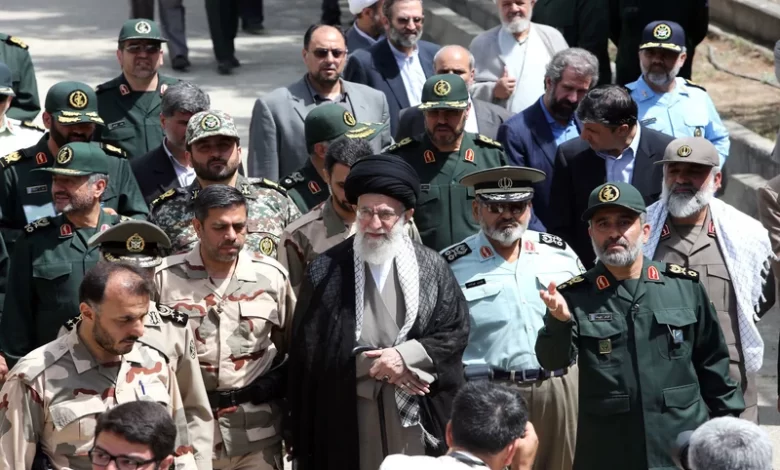Iran Regime’s Demand for IRGC Delisting May Be Chipping Away at Optimism for Nuclear Deal

Written by
Mehdi Oghbai
During a joint press conference with his Syrian counterpart, while visiting Damascus, the Iranian regime’s Foreign Minister Hossein Amir-Abdollahian claimed that negotiations in Vienna are closer than ever to restoring the 2015 Iran nuclear deal, which the regime in Tehran began violating soon after the US pulled out of the agreement in 2018.
Since the Vienna talks began last April, optimism has been predominant in public statements from each of the participants, including the US, whose participation is indirect on account of Tehran’s refusal to allow its representatives to meet with their American counterparts. Amir-Abdollahian’s latest expression of that optimism was echoed by Russian officials when they confidently predicted that the Iranian party would reenter the Vienna talks with the intention of adopting a draft agreement soon after last Sunday’s Nowruz holiday, or Iranian New Year.
The US initially echoed that optimism as well, but on Tuesday it took a notably different tack, with State Department officials telling the media that the American government was “preparing equally” for the mutual revival of the Joint Comprehensive Plan of Action (JCPOA) and for its complete collapse.
These statements reflect early warnings from the Biden administration regarding its willingness to implement a “Plan B” in the event that diplomacy fails to forestall the Iranian regime’s progress toward a nuclear weapons capability. But those statements had evidently not been repeated at a high level for several months before State Department spokesperson Ned Price acknowledged on Monday that “an agreement is neither imminent nor is it certain.”
This sentiment was initially tempered by the insistence that negotiations in Vienna were “close to a possible deal” despite “remaining issues” that needed to be bridged. But the following day, Price declared that “the onus is on Tehran to make decisions that it might consider difficult,” and that the White House is by no means taking it for granted that Iranian officials are both willing and able to do so. At the same time, he said that the US is prepared to make its own “difficult decisions to return Iran’s nuclear program to its JCPOA limits,” despite Tehran’s repeated insistence that those decisions on the American side were the only remaining obstacle to a deal.
In fact, Iran has repeated that line many times during the latest rounds of negotiations, while also continually adding to its demands for the political decisions in question. Last month, it was widely reported that the talks were on the verge of their conclusion when Tehran’s lead negotiator Ali Bagheri-Kani left Vienna for Iran to consult with higher authorities. When he returned, however, the Iranian team began loudly insisting that the US withdraw the terrorist designation that was imposed on the Islamic Revolutionary Guard Corps (IRGC) in 2019, as a precondition for any new agreement.
It seems possible that this has stretched the limit of the Biden administration’s willingness to provide concessions to Tehran, thereby forcing a return to prior talking points regarding a possible diplomatic collapse and “Plan B.” This interpretation of the latest US statements is arguably supported by Price’s parallel comments on the administration’s commitment to conferring with its allies on a forthcoming course of action. Some of those allies have loudly condemned the notion of delisting the IRGC.
Some Democrats have also expressed serious concerns while reiterating their colleagues’ insistence that any pending agreement must be submitted for congressional review. As Tehran’s demands for that agreement have expanded, so too has the volume of the backlash on both sides of the political aisle in Washington, making it potentially impossible or too politically costly for the White House to press forward on the current trajectory.
Iranian demands for the IRGC’s delisting may mark a turning point for the Biden administration’s political calculations, as it seems to have prompted new public statements from Democratic lawmakers who may not have been highly engaged with this issue in the past. For instance, Josh Gottheimer, a Democratic congressman representing New Jersey, appeared on Fox News on Tuesday to say that delisting the IRGC “makes zero sense” in light of its very public record of terrorist activity and the support of regional terrorist proxies.
The delisting request has also seemingly prompted certain media outlets to reach out more actively for comments on lawmakers’ overall views about the looming nuclear deal. Shontel Brown, a freshman Democrat representing Ohio, told one such outlet on Thursday that she “will review any announced deal closely to determine whether it will make the U.S. safer [and] improve stability in the region.”
Brown also helped to revive another seemingly lost Biden administration talking point by emphasizing her continued hope for a “longer and stronger” agreement than that which was implemented in January 2016. She openly acknowledged the unresolved “shortcomings” of the JCPOA and promised to “encourage” the administration to rectify “its failure to address Iran’s ballistic missile program or Iran’s support for regional terrorist proxies like Hezbollah and Hamas.”
Of course, any agreement that includes the delisting of the IRGC would be widely regarded as either ignoring these issues or actually making them worse. IRGC currently wields unilateral control over the regime’s ballistic missile arsenal, and earlier in March, it demonstrated its commitment to the continued advancement of relevant rocket technologies when it boasted of having launched a second surveillance satellite into low Earth orbit. The IRGC also maintains a dedicated foreign operations division, the Quds Force, to aid in the proliferation of foreign terrorist groups and operations.

